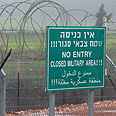
Israel-Lebanon border
Photo: Avihu Shapira
Israel, according to the foreign press, attacked at dawn Wednesday a Hezbollah weapons convoy along the Lebanon-Syria border. If an attack did in fact take place, was it a prelude to a broad military conflict on the northern front? We should look for the answer to this question, first of all, in the IDF's General Staff.
Lieutenant General Benny Gantz, his deputy Gadi Eizenkot and Military Intelligence chief Maj. Gen. Aviv Kochavi are advocates of covert activity as part of what is referred to in the army as the "prevention policy" – this is how we can also interpret the reports of a previous attack on a weapons convoy in Sudan. If, for instance, it is possible to prevent the transfer of weapons from Iran by destroying them along the way – this is preferable to launching a ground operation after the weapons have already reached Gaza or Lebanon.
Strike in Sudan
Ron Ben-Yishai
Op-ed: Alleged bombing of Sudan arms factory forces Tehran to reassess Israeli threats
In general, this policy applies to any hostile activities or preparations, and the goal is to destroy the threats as far away as possible, preferably during the preparation stage. The risk is that the activity, in an enemy state, may go wrong; and there is also the risk of angering friendly countries while jeopardizing national interests. This policy works as long as it remains covert, and this is where its main drawback lies: As soon as your operation is exposed, or if you left your "fingerprints" on the attack, you invite the other side to respond. It is at this precise point that a war can break out – a war you may not have wanted; a war that does not justify the price you will pay.
Over the past year, as he has lost more and more ground to rebel forces, Syrian President Bashar Assad has been transferring large amounts of his strategic weapons – such as the various Scud missiles and chemical warfare agents – to areas he has more control over. These movements have been a cause of great concern for Western intelligence agencies, who feared these weapons were about to reach Lebanon. But the intelligence and military tension has alternately escalated and decreased as the Alawite regime gradually wears down.
According to foreign reports, Israel attacked in the past weapons convoys and a warehouse in Sudan and destroyed long-range rockets. The weapons convoys, which departed from Libya, were hit, smugglers' ships were sunk in the Red Sea, various ammunition warehouses exploded in Lebanon every once in a while – but Israel did not attack in Lebanon, although it was aware that Hezbollah received shipments of Scud missiles, long-range M-600 missiles and all the other types of rockets and missiles the Syrian army possesses.
Like any other country, Israel has to determine when it can take a risk and attack without running the risk of getting involved in a full-blown war, and when it is better to hold back because it does not want to pay the price of an open military conflict.
Despite the fact that Israel is not interested in an extensive confrontation on the Lebanese front, over the past year – and particularly over the past few months – the IDF has been preparing for such a conflict. Apart from the physical preparedness, army brass is mentally prepared for the possibility that a conflict will break out. Therefore, it is safe to assume that Israel is closer to a military conflict in the north today than it has been at any point in time since the Second Lebanon War.















